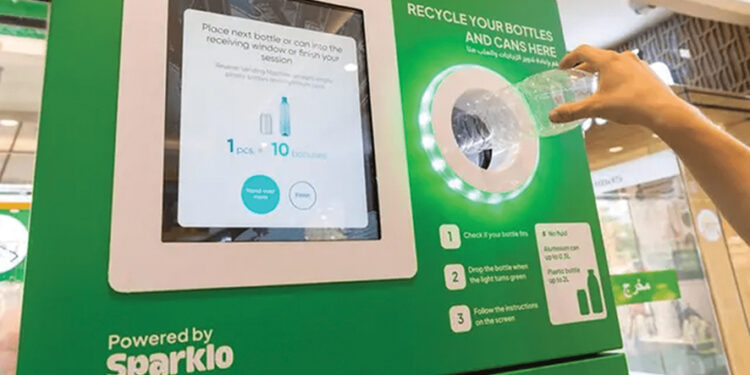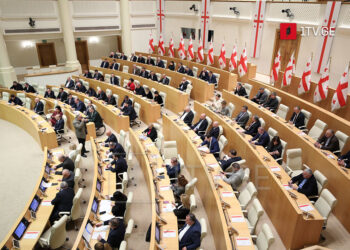When the Lithuanian entrepreneur Dainius Sakalauskas announced the rollout of Sparklo’s operations in Georgia, many saw it as just another international company entering the Georgian market. However, Sparklo is no ordinary enterprise. It represents a transformative vision that fuses environmental responsibility, cutting-edge technology, and socio-economic innovation—a model that has already succeeded in 14 countries worldwide. As Sparklo plans to expand its presence in Georgia from 58 recycling machines (“Sparklomats”) to 200 by May this year, it’s time to unpack the broader implications of this initiative for the country’s ecology, economy, and society.
At its core, Sparklo operates on the principles of the circular economy, a concept that challenges the traditional linear “take-make-dispose” model of production and consumption. Instead of treating used PET bottles as waste, Sparklo reimagines them as valuable resources. The company incentivizes citizens to deposit their used bottles into Sparklomats by awarding points redeemable for high-value gifts. Furthermore, with the anticipated adoption of Georgia’s deposit system law, Sparklo’s initiative will enable citizens to receive monetary compensation of up to 20 tetri per bottle.
This system is more than an economic exchange; it’s a behavioral nudge. By attaching tangible rewards to responsible waste disposal, Sparklo subtly shifts societal attitudes toward sustainability. Such behavioral economic interventions, grounded in psychological and sociological research, have proven effective in countries like Germany and Sweden, where deposit refund schemes have achieved recycling rates exceeding 90%.
Georgia’s waste management crisis has been a persistent issue, exacerbated by the declining global market value of PET materials. Local recycling companies, unable to compete with cheap virgin plastics, have largely abandoned the purchase of secondary materials. As a result, vast quantities of plastic waste are buried in Georgian soil each year, posing severe ecological risks.
Sparklo’s entry into the market offers a lifeline. By creating a steady stream of high-quality PET materials ready for processing, the company reinvigorates the recycling industry. Moreover, the reduction in landfill plastic could have cascading benefits for soil health, water quality, and biodiversity. In a country where natural beauty is a cornerstone of cultural identity and tourism, such ecological improvements are invaluable.
The economic impact of Sparklo’s operations extends beyond waste management. The deployment of 200 Sparklomats across Georgia represents a significant investment in infrastructure and technology. Each machine serves as a micro-hub of economic activity, driving foot traffic to the locations that host them, be it supermarkets, community centers, or public spaces.

More importantly, Sparklo’s model fosters a new kind of micro-economy. By converting waste into a currency of sorts, it democratizes access to goods and services, particularly for lower-income citizens who can exchange points for gifts of greater value. In doing so, Sparklo subtly addresses issues of economic inequality while promoting sustainable practices.
At its heart, Sparklo is not just a technological solution, but a cultural intervention. Georgia, like many post-Soviet countries, has historically grappled with the dual legacies of industrial neglect and consumerist excess. Waste management has often been relegated to the background, perceived as a peripheral issue rather than a societal priority.
Sparklo challenges this narrative by embedding ecological responsibility into everyday life. The act of depositing a bottle into a Sparklomat becomes a symbolic gesture of care—for the environment, for future generations, and for the broader community. Such small acts, repeated en masse, can lead to profound cultural shifts, aligning with the ethos of Georgian hospitality and respect for nature.
From an anthropological perspective, Sparklo’s initiative also raises fascinating questions about the commodification of waste. What does it mean to assign monetary value to trash? How does this redefinition of waste reshape our understanding of consumption and production? These are not merely theoretical musings but practical considerations for a world increasingly driven by the principles of sustainability.
Despite its promise, Sparklo’s journey in Georgia is not without hurdles. The success of its model hinges on widespread public adoption, robust legal frameworks, and sustained economic incentives. Public awareness campaigns will be crucial to educate citizens about the benefits of recycling and the mechanics of the Sparklo system. Equally important is the timely passage and enforcement of deposit system legislation, which will underpin the financial viability of Sparklo’s operations.
However, the potential rewards far outweigh the risks. If successful, Sparklo could serve as a blueprint for other countries grappling with similar waste management challenges. Moreover, its integration into Georgia’s socio-economic fabric could inspire a new wave of eco-entrepreneurship, catalyzing innovations in areas ranging from renewable energy to sustainable agriculture.
By Ivan Nechaev














